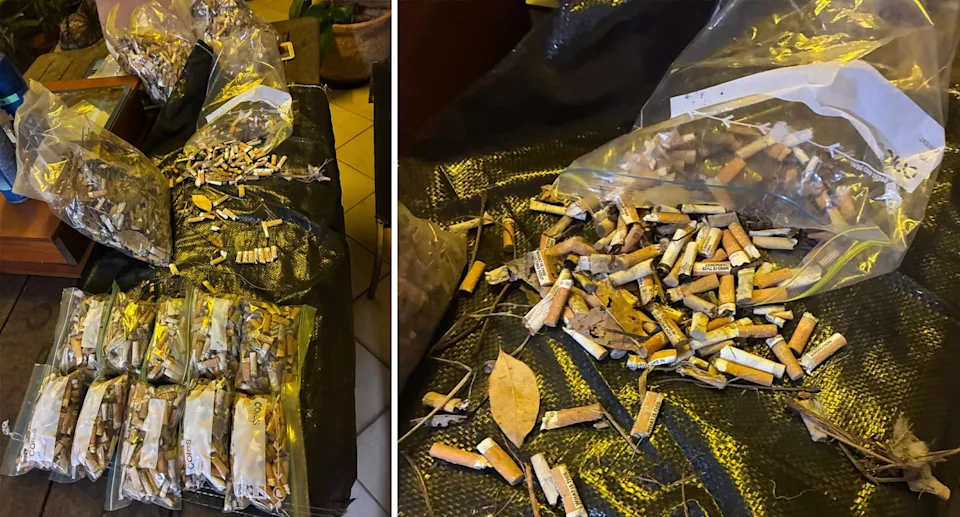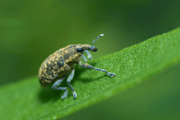
A single section of parkland near Townsville University Hospital revealed an astonishing sight last weekend.
Volunteers expected a routine cleanup, but what they found left even experienced environmentalists shocked.
Thousands of tiny, toxic remnants littered the ground, silently threatening both nature and community.
When Dave Dudley and nine volunteers from Tidy-Up Townsville arrived armed with gloves and rubbish bags, they planned to tackle just 80 square metres of parkland.
Two hours later, they had collected 5,000 cigarette butts—more than anyone anticipated from an area smaller than a tennis court.
'It's disgusting. It just shouldn't happen.'
The sheer scale of cigarette butt pollution is a persistent problem in Australia.
Around seven billion butts are discarded every year, meaning nearly 300 per Australian, including non-smokers and babies.
The financial toll is equally staggering.
Governments spend an estimated $73 million annually removing tobacco-related litter, a cost ultimately borne by taxpayers.
That money could instead fund approximately 146 new teacher salaries or dozens of community centres, yet it cleans up after six out of 10 Australian smokers who litter outdoors.
State-by-state cigarette littering fines
Queensland: $322 for littering cigarette butts
New South Wales: $160 for unlit cigarettes, $1,000 for lit cigarettes
Victoria: $790 for tossing butts from vehicles
Western Australia: $200 for cigarette butts, $500 for lit cigarettes
Cigarette butts are more than unsightly—they are toxic.
Made from non-biodegradable plastic, they can take up to 14 years to decompose and leach harmful chemicals into waterways.
Streets wash these butts into stormwater drains, releasing cadmium, lead and zinc that threaten aquatic life.
Wildlife suffers profoundly from this pollution.
Birds, turtles, whales and fish have been found with cigarette butts in their stomachs, affecting digestion and causing poisoning or starvation.
The viral 2019 image of a bird feeding a cigarette butt to its chick is a reminder that these incidents are not isolated.
Australia's cigarette butt crisis by the numbers
- 7 billion cigarette butts littered annually
- $73 million taxpayer cleanup cost per year
- 12-15 years for each butt to decompose
- 700 landscape fires in WA alone caused by discarded lit cigarettes
- 100 toxic chemicals leaching into environment
When cigarettes become fire hazards
Cigarettes also pose a fire risk.
The Western Australian Department of Fire and Emergency Services responded to roughly 700 landscape fires each year caused by discarded lit cigarettes.
Penalties rise sharply for lit cigarettes because they create a public hazard, with fines reaching $500–$1,000.
Did you know?
Did you know Despite smoking bans at many beaches, a council waste audit found nearly 20 per cent of litter collected on Bondi Beach last summer consisted of cigarette butts, showing even famous, well-maintained beaches struggle with this problem.
Solutions gaining ground across Australia
Communities and policymakers are seeking solutions.
Dave Dudley’s approach of sending collected butts to politicians exemplifies a growing push for accountability.
WWF Australia estimates that holding tobacco companies responsible could prevent four billion plastic cigarette butts from entering the environment each year, cutting pollution by more than 50 per cent.
A levy of less than half a cent per cigarette could fund a $71 million national product stewardship scheme.
Practical steps are also making a difference.
Pocket ashtrays are becoming more popular among environmentally conscious smokers, while some councils have installed additional bins or cigarette recycling stations.
Non-smokers can help by registering as litter reporters to assist authorities in identifying offenders.
Community impact and awareness
Dave Dudley’s weekend effort in Townsville highlighted how cigarette butt pollution affects everyone—from taxpayers funding cleanup, to beachgoers, to parents worried about wildlife.
The 5,000 butts collected sparked discussions on solutions across Queensland and Western Australia, proving that small local actions can expose and address larger environmental problems.
What This Means For You
Dave Dudley and his team of volunteers collected 5,000 cigarette butts from just 80 square metres of parkland, highlighting the scale of this persistent problem.
Cigarette butts are Australia’s most littered plastic item and cost taxpayers a staggering $73 million every year.
Beyond the financial burden, this litter harms wildlife, leaches toxic chemicals into the environment, and can take up to 14 years to decompose.
Solutions are emerging, including product stewardship levies, pocket ashtrays, additional disposal bins, and community litter reporting.
For everyday Australians, this issue is more than an environmental concern—it affects the places we live, the parks we enjoy, and the wildlife we care about, reminding us that small actions and awareness can make a real difference.
If the scale of cigarette butt pollution in Townsville shocked you, there’s more to explore about how litter impacts our waterways.
Recent volunteer efforts have revealed just how widespread and harmful pollution can be when it enters rivers, bays, and coastal areas.
This story provides a deeper look at the challenges and discoveries made while tackling environmental pollution firsthand.
Read more: Volunteers uncover shocking truth behind Australia's waterway pollution
Cigarette Butts — Explains that cigarette butts are the world's most littered plastic item, with around seven billion discarded annually in Australia, and details their environmental impact.
https://www.cleanup.org.au/cigarette-butts
Litter information | Western Australian Government — Provides statistics on cigarette butt litter, noting that approximately seven billion of 24 billion filtered cigarettes sold are littered each year.
https://www.wa.gov.au/service/environment/litter-information
New report shows Australia can halve plastic cigarette butt litter | WWF Australia — Highlights that cigarettes are consistently the most littered item and suggests policy measures to halve plastic cigarette butt pollution.
https://www.wwf.org.au/news/2021/new-report-shows-australia-can-halve-plastic-cigarette-butt-litter/
Butt Out — Discusses the financial burden of tobacco-related litter removal, estimated at $73 million annually, mostly paid by state, territory, and local governments.
https://www.cleanup.org.au/buttout
Litter information | Western Australian Government — Notes that six out of 10 smokers litter their cigarette butts outdoors, contributing significantly to environmental pollution.
https://www.wa.gov.au/service/environment/litter-information
Cigarette Butts — Details the toxic legacy of cigarette filters, which are non-biodegradable, take up to 14 years to decompose, and leach harmful chemicals into marine environments.
https://www.cleanup.org.au/cigarette-butts
Litter information | Western Australian Government — Explains that littered cigarette butts wash into stormwater drains and waterways, releasing cadmium, lead, and zinc.
https://www.wa.gov.au/service/environment/litter-information
Cigarette Butts — States that one-third of nearly 100 chemicals leaching from cigarette butts are toxic to aquatic species.
https://www.cleanup.org.au/cigarette-butts
Cigarette Butts — Notes that cigarette butts have been found in the stomachs of birds, turtles, whales, and fish, affecting digestion and causing poisoning or starvation.
https://www.cleanup.org.au/cigarette-butts
Litter information | Western Australian Government — Reports that discarded lit cigarette butts cause approximately 700 landscape fires annually in Western Australia.
https://www.wa.gov.au/service/environment/litter-information
Litter information | Western Australian Government — States that fines for littering lit cigarettes range from $500 to $1,000 as it creates a public risk.
https://www.wa.gov.au/service/environment/litter-information
New report shows Australia can halve plastic cigarette butt litter | WWF Australia — Suggests making tobacco companies responsible for the pollution could stop around four billion plastic cigarette butts from entering the environment yearly.
https://www.wwf.org.au/news/2021/new-report-shows-australia-can-halve-plastic-cigarette-butt-litter/
New report shows Australia can halve plastic cigarette butt litter | WWF Australia — Recommends a levy of less than half a cent per cigarette to fund a national product stewardship scheme raising $71 million annually.
https://www.wwf.org.au/news/2021/new-report-shows-australia-can-halve-plastic-cigarette-butt-litter/
Litter information | Western Australian Government — Encourages carrying a pocket ashtray when no bins are available to prevent littering.
https://www.wa.gov.au/service/environment/litter-information
Litter information | Western Australian Government — Suggests that non-smokers can register as litter reporters to help authorities identify litterers.
https://www.wa.gov.au/service/environment/litter-information
Have you noticed cigarette butt littering hotspots in your community, and what creative solutions could work there?







